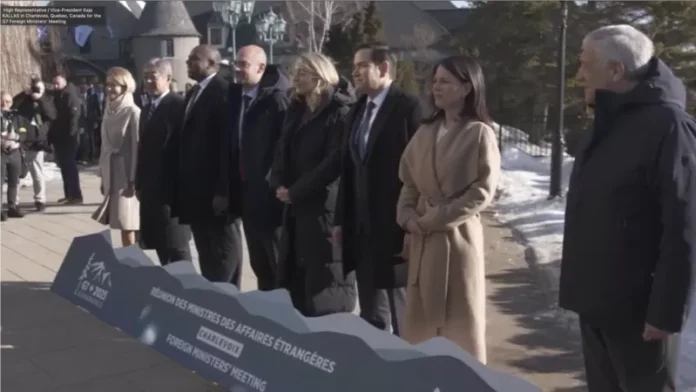CHARLEVOIX, QUEBEC — The picturesque town of Charlevoix, Quebec is currently playing host to the top diplomats from the Group of Seven leading industrial nations. As Canada takes on the role of host country for this year’s G7 summit, it has outlined a bold and ambitious agenda, with a focus on achieving a “just and lasting peace in Ukraine” and strengthening security and defense partnerships as the G7 marks its 50th anniversary.
During the opening remarks, Canadian Foreign Minister Melanie Joly emphasized the importance of peace and stability, stating that it is at the top of the agenda for this year’s summit. She also expressed her commitment to supporting Ukraine in the face of Russia’s illegal aggression.
The G7 talks in Quebec come on the heels of U.S.-Ukraine talks in Jeddah, Saudi Arabia, where Ukraine has expressed its readiness to accept a U.S. proposal for an immediate, interim 30-day ceasefire. This is a significant step towards achieving peace in the region, and U.S. Secretary of State Marco Rubio has expressed hope that a ceasefire could be in place within days if the Kremlin agrees.
In a post on social media platform X, Ukrainian President Volodymyr Zelenskyy wrote that his country is committed to moving quickly towards peace and is prepared to do its part in creating the conditions for a reliable, durable, and decent peace. He also welcomed the U.S. proposal to extend the ceasefire to land, stating that Ukraine is ready for an air and sea ceasefire.
Russian President Vladimir Putin has also expressed support for the U.S. ceasefire proposal in principle, but has stated that key details still need to be worked out. This is a positive development and shows that both sides are willing to work towards a peaceful resolution.
However, European Union foreign policy chief Kaja Kallas has stressed the need for firmness in the negotiations, stating that ceasefire cannot come with conditions. She also highlighted the fact that Russia has heavily invested in its military and may be reluctant to end the war. This is where the G7 nations can play a crucial role in finding a solution that benefits all parties involved.
Apart from the discussions on Ukraine, the G7 foreign ministers also delved into other important global security issues, including China’s role in global security, Indo-Pacific stability, and maritime security. These discussions were held behind closed doors, highlighting the seriousness with which these issues are being addressed.
U.S. Secretary of State Marco Rubio is expected to have a pull-aside meeting with Japanese Foreign Minister Takeshi Iwaya on Thursday. This meeting is significant as it shows the strong partnership between the U.S. and Japan in addressing global security challenges.
One of the key points of discussion during the G7 talks has been the need for monitors if a ceasefire is implemented. This is a crucial step in ensuring that both sides adhere to the terms of the ceasefire and that peace is maintained in the region. Rubio has stated that determining who both sides trust to be on the ground to monitor small arms fire and exchanges will be a key factor in the success of the ceasefire.
In addition to the discussions on global security, the G7 foreign ministers also focused on the economic recovery from the COVID-19 pandemic. The G7 nations, which include Britain, Canada, France, Germany, Italy, Japan, and the United States, have been at the forefront of the global response to the pandemic and are committed to working together to ensure a strong and sustainable recovery.
As the G7 marks its 50th anniversary, this year’s summit holds special significance. It is a testament to the strength and resilience of these nations and their commitment to working together towards a better and more peaceful world. The G7 talks in Charlevoix, Quebec are a crucial step towards achieving this goal, and the world is watching with hope and optimism.

